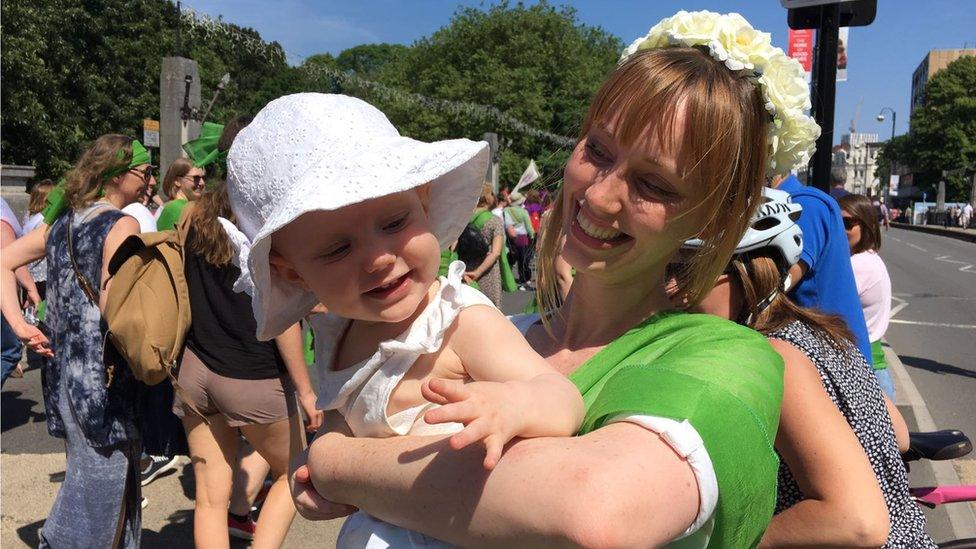Voices from Cardiff procession: 100 years of voting
- Published
Processions are being held in Cardiff, Edinburgh, Belfast and London to mark 100 years since the first British women won the right to vote.
Many of the 10,000 women expected to take part in Cardiff will be carrying homemade banners brandishing the hopes and concerns of women in the 21st Century.
Participants will also wear a wrap in green, white or purple - the Suffragette colours - and be choreographed into bands to create a moving artwork as they travel through the streets.
Here are the voices of some of the women involved.
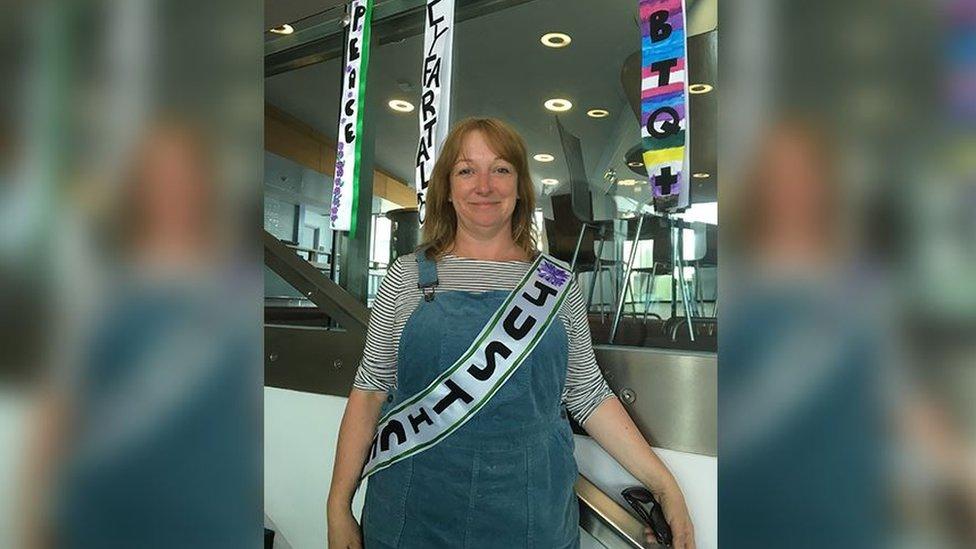
Sally Evans, of Newport, worked with refugees and asylum seekers to make banners
Sally Evans, of Newport, Gwent, works part-time for the South East Wales Racial Equality Council (SEWREC) and Newport's Riverfront Theatre and Arts Centre. She has helped make banners for both places. She said:
In SEWREC, I work with refugees and asylum seekers, many of them women who have faced challenging situations in their lives.
The women made a felt banner around the phrase "And so I rise" from a Maya Angelou poem.
Some individuals also chose to make flags from their home countries and smaller banners in their own languages.
At the Riverfront, the women made a banner in the design of a mandala - the symbol of peace - and added words or phrases about the rights of women or empowerment of girls.
For me personally, I feel it is important that Newport has a good showing in the procession.
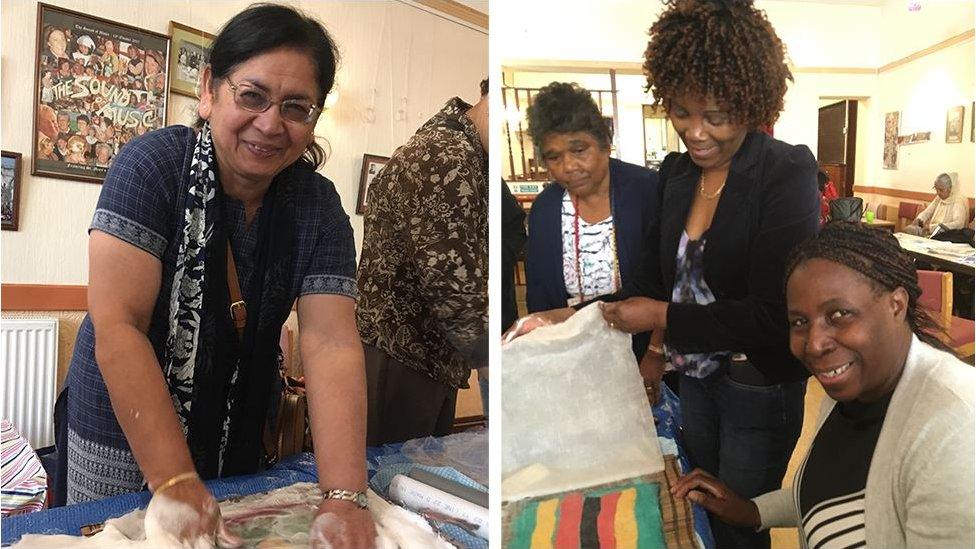
Some of the Newport women who helped make the banners
So much history stems from here - not just the Chartist movement, which sought political rights for the working classes - but also the suffragette Lady Rhondda.
Newport has a tagline - the "city of democracy" - so it is very important we express this during the procession.
For me, it is such a good opportunity to think about how far women have come but also how far we have to go.
In my work I see the challenges refugees and asylum seekers face - particularly in terms of social isolation and feeling displaced.
Many of the women we help have been deeply traumatised by what they have been through.
They need to feel part of a community, and safe within their city. Making these banners, and bringing women together in a bond of sisterhood, has helped achieve that.
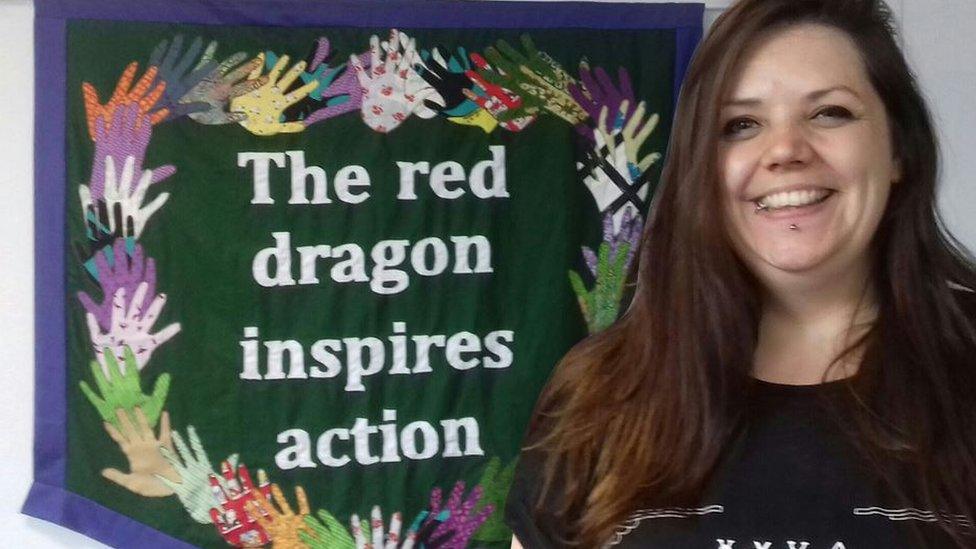
Tasha Middleton, of Sew Swansea, helped make a banner inspired by designs from Greenham Common
Tasha Middleton, of Swansea, set up the first WI in Swansea city centre. She runs Sew Swansea and teaches textiles to diverse groups across the city. She said:
The design of the banner I was involved in was based on the work of Thalia Campbell - a leading banner maker of the Greenham Common protests in the eighties.
She made wonderful banners for nuclear disarmament and women's rights. We - myself and five other artists - wanted to re-imagine her work, making it relevant to modern women.
In the centre of our banner is the slogan "The Red Dragon Inspires Action" to show the power of Welsh women.
During our research, we discovered that at one point during the Greenham Common protests, 70,000 women were holding hands around the perimeter fence.
So we put hands around the edge of our banner too. We wanted to highlight all the ways in which women have lent a hand in history - helping during the miners' strikes and in the war effort.
I think this procession is fantastically important to highlight problems women still face.
A lot of the women who come to my sewing groups have low confidence, depression and anxiety. They can feel like they have no voice and that they are powerless.
Women still face big issues - a large amount of sexism and sexual assault.
Bringing together women for any occasion is a passionate, powerful thing.
It is really important that we see our worth and what we can achieve, especially together.
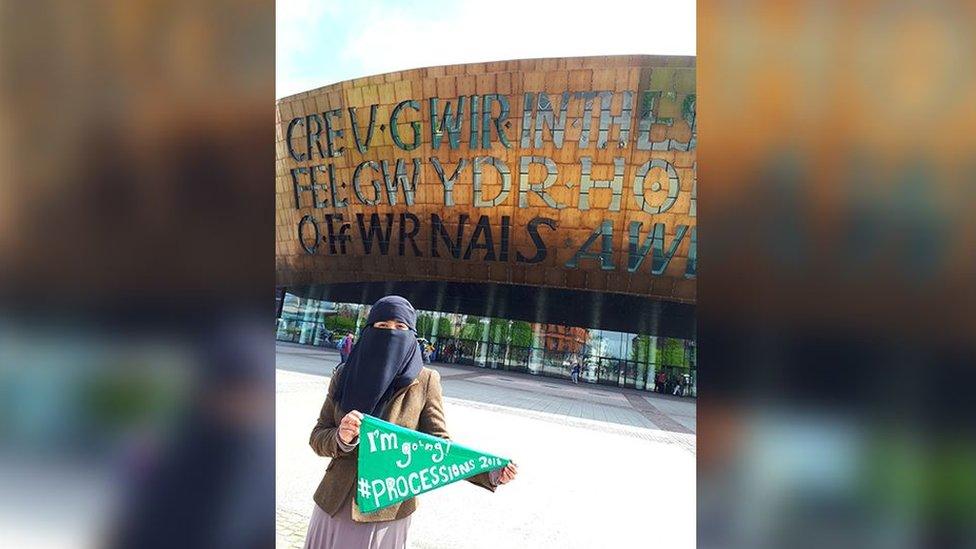
Sahar Al-Faifi, outside the Wales Millennium Centre
Sahar Al-Faifi, of Cardiff, is a molecular geneticist and community activist. She said:
Even before the procession was announced, I had been involved in centenary events to mark the first women getting the vote in Britain.
I helped organise a screening of the film Suffragette and a discussion panel to consider the inequalities faced by women today.
When I was invited to take part in the procession, I wanted to make a banner to represent women of faith and colour.
I'm a scientist, so I gathered six Muslim artists and began designing. We came up with two main messages.
Firstly, we wanted to show the diversity of Muslim women. So often we are treated the same and painted with the same brush.
Secondly, there is a famous Islamic phrase, which says, "Women are one half of society which gives birth to the other half, so it is as if they are the entire society."
This is why women need to be represented in all aspects of life.
Our banner has been digitally designed and printed, with some handwork added afterwards. It has suffragette colours, Arabic calligraphy spelling out "freedom" and Andalusian geometry.
I'm really excited about attending the procession. I feel it's going to be a massive medium to meet other women and share stories.
One hundred years ago, we gained the right to vote, but there are still so many inequalities, such as the gender pay gap.
Women's issues are universal issues. But speaking as a woman of faith and colour, racism and Islamophobia, especially in the workplace, affect me more.
The six artists who helped create the banner were Mariya Zaman, Shaimaa Osman, Nabila Ahmed, Emmi Khan, Jaffrin Khan and Husna Hussain.
- Published10 June 2018
